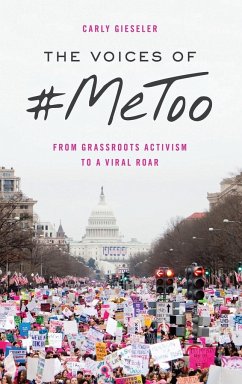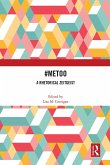- Gebundenes Buch
- Merkliste
- Auf die Merkliste
- Bewerten Bewerten
- Teilen
- Produkt teilen
- Produkterinnerung
- Produkterinnerung
The Voices of #MeToo: From Grassroots Activism to a Viral Roar is a timely and accessible analysis of how marginalized voices are engaged or silenced in one of the most successful social media projects in recent history. It is essential reading for anyone seeking to understand social movements and "hashtag activism" in the digital age.
Andere Kunden interessierten sich auch für
![Transformed Communication Codes in the Mediated World Transformed Communication Codes in the Mediated World]() Transformed Communication Codes in the Mediated World252,99 €
Transformed Communication Codes in the Mediated World252,99 €![#MeToo #MeToo]() #MeToo194,99 €
#MeToo194,99 €![The Culture of Efficiency The Culture of Efficiency]() The Culture of Efficiency43,10 €
The Culture of Efficiency43,10 €![Dishing Dirt in the Digital Age Dishing Dirt in the Digital Age]() Erin A. MeyersDishing Dirt in the Digital Age40,50 €
Erin A. MeyersDishing Dirt in the Digital Age40,50 €![Ethics and Religion in the Age of Social Media Ethics and Religion in the Age of Social Media]() Kevin HealeyEthics and Religion in the Age of Social Media195,99 €
Kevin HealeyEthics and Religion in the Age of Social Media195,99 €![Communist Rhetoric and Feminist Voices in Cold War America Communist Rhetoric and Feminist Voices in Cold War America]() Jennifer KeohaneCommunist Rhetoric and Feminist Voices in Cold War America120,99 €
Jennifer KeohaneCommunist Rhetoric and Feminist Voices in Cold War America120,99 €![Tweening the Girl Tweening the Girl]() Natalie CoulterTweening the Girl40,50 €
Natalie CoulterTweening the Girl40,50 €-
-
-
The Voices of #MeToo: From Grassroots Activism to a Viral Roar is a timely and accessible analysis of how marginalized voices are engaged or silenced in one of the most successful social media projects in recent history. It is essential reading for anyone seeking to understand social movements and "hashtag activism" in the digital age.
Hinweis: Dieser Artikel kann nur an eine deutsche Lieferadresse ausgeliefert werden.
Hinweis: Dieser Artikel kann nur an eine deutsche Lieferadresse ausgeliefert werden.
Produktdetails
- Produktdetails
- Verlag: Rowman & Littlefield Publishers
- Seitenzahl: 186
- Erscheinungstermin: 23. Juli 2019
- Englisch
- Abmessung: 235mm x 157mm x 15mm
- Gewicht: 429g
- ISBN-13: 9781538128008
- ISBN-10: 1538128004
- Artikelnr.: 56789498
- Herstellerkennzeichnung
- Libri GmbH
- Europaallee 1
- 36244 Bad Hersfeld
- gpsr@libri.de
- Verlag: Rowman & Littlefield Publishers
- Seitenzahl: 186
- Erscheinungstermin: 23. Juli 2019
- Englisch
- Abmessung: 235mm x 157mm x 15mm
- Gewicht: 429g
- ISBN-13: 9781538128008
- ISBN-10: 1538128004
- Artikelnr.: 56789498
- Herstellerkennzeichnung
- Libri GmbH
- Europaallee 1
- 36244 Bad Hersfeld
- gpsr@libri.de
Carly Gieseler is Associate Professor of Speech Communication in the Department of Performing and Fine Arts at York College - City University of New York. She holds a Ph.D. in Communication from the University of South Florida. Her work focuses on intersectional issues of performance, identity and representation in emerging trends, activist movements, and marginalized communities across our changing media and communication landscape.
Acknowledgments Chapter One: "The Silence Breakers": The Social Media
Activism of #MeToo I. The Voices of #MeToo 1. Challenges of Change 2.
Meeting the Challenge 3. A History of Collective Action 4. Social Media and
#Intersectionality II. Intersectional Approaches 1. Mapping the Margins 2.
Not a Moment, But a Movement Chapter Two: "When Movie Stars don't Know
Where to Go, What Hope is There for the Rest of Us?" The Public and Private
Faces of #MeToo I. The Celebrity Machine 1. Critical Mass a. Consumerism b.
Reductionism 2. Social Media is the Message 3. Performing Activism 4.
Agents of Change Chapter Three: "Sisters Still Managed to Get Diminished or
Erased": Tarana Burke's Grassroots Goal and the Implications of #MeToo for
Women of Color 1. Intersectional Interventions I. The Activism of Everyday
Survival 1. Cultural Guardians: Black Female Activists 2. A Legacy of
Silenced Voices 3. Pipelines of Abuse 4. WOC Online II. Recuperating the
99% Chapter Four: "Most of Us Were Never Taught the Language with Which to
Understand the Experiences of our Youth": The Double-Bind of Silenced
Sexual Victimization in the LGBTQ+ Community 1. Statistics and Silence 2.
Multifaceted Oppression a. Fetishization b. Bisexuality c. Trans Community
d. LGBTQ+ Youth 3. Internalization 4. Binaried Language 5. #MeQueer I. A
Worthy Goal 1. Prism of Reckoning Chapter Five: "The Fastest Way to
Discredit Any Women's Rights Struggle is to Say it Comes from Somewhere
Else": Global Responses to #MeToo I. MeToo Rising Worldwide 1. Collective
Understanding 2. Statistical Context 3. Global Responses a. Australia b.
Brazil c. China d. Denmark e. England f. France g. Kenya h. India i.
Ireland j. Japan k. Philippines l. Russia m. South Korea n. Spain o. Sweden
II. The Shared Language of Change Chapter Six: "Disability is the One
Minority Group We Can All Join": The Omission of People with Disabilities
from #MeToo I. Sexual Citizenship 1. A Personhood up for Grabs 2.
Educational Justice II. Blank Boxes and Intersectionality Chapter Seven:
"Perhaps all the Moment Requires is for Men to Shut Up and Listen": Toxic
Masculinity and Male Responses to #MeToo I. Hegemonic Backlash 1. The Toxic
Locker Room 2. Networked Misogyny 3. From Bystanders to Upstanders 4. The
Hazards of Conformity II. #WeDo Believe Male Survivors III. Fragile
Strength 1. The Wake-Up Call Final Thoughts
Activism of #MeToo I. The Voices of #MeToo 1. Challenges of Change 2.
Meeting the Challenge 3. A History of Collective Action 4. Social Media and
#Intersectionality II. Intersectional Approaches 1. Mapping the Margins 2.
Not a Moment, But a Movement Chapter Two: "When Movie Stars don't Know
Where to Go, What Hope is There for the Rest of Us?" The Public and Private
Faces of #MeToo I. The Celebrity Machine 1. Critical Mass a. Consumerism b.
Reductionism 2. Social Media is the Message 3. Performing Activism 4.
Agents of Change Chapter Three: "Sisters Still Managed to Get Diminished or
Erased": Tarana Burke's Grassroots Goal and the Implications of #MeToo for
Women of Color 1. Intersectional Interventions I. The Activism of Everyday
Survival 1. Cultural Guardians: Black Female Activists 2. A Legacy of
Silenced Voices 3. Pipelines of Abuse 4. WOC Online II. Recuperating the
99% Chapter Four: "Most of Us Were Never Taught the Language with Which to
Understand the Experiences of our Youth": The Double-Bind of Silenced
Sexual Victimization in the LGBTQ+ Community 1. Statistics and Silence 2.
Multifaceted Oppression a. Fetishization b. Bisexuality c. Trans Community
d. LGBTQ+ Youth 3. Internalization 4. Binaried Language 5. #MeQueer I. A
Worthy Goal 1. Prism of Reckoning Chapter Five: "The Fastest Way to
Discredit Any Women's Rights Struggle is to Say it Comes from Somewhere
Else": Global Responses to #MeToo I. MeToo Rising Worldwide 1. Collective
Understanding 2. Statistical Context 3. Global Responses a. Australia b.
Brazil c. China d. Denmark e. England f. France g. Kenya h. India i.
Ireland j. Japan k. Philippines l. Russia m. South Korea n. Spain o. Sweden
II. The Shared Language of Change Chapter Six: "Disability is the One
Minority Group We Can All Join": The Omission of People with Disabilities
from #MeToo I. Sexual Citizenship 1. A Personhood up for Grabs 2.
Educational Justice II. Blank Boxes and Intersectionality Chapter Seven:
"Perhaps all the Moment Requires is for Men to Shut Up and Listen": Toxic
Masculinity and Male Responses to #MeToo I. Hegemonic Backlash 1. The Toxic
Locker Room 2. Networked Misogyny 3. From Bystanders to Upstanders 4. The
Hazards of Conformity II. #WeDo Believe Male Survivors III. Fragile
Strength 1. The Wake-Up Call Final Thoughts
Acknowledgments Chapter One: "The Silence Breakers": The Social Media
Activism of #MeToo I. The Voices of #MeToo 1. Challenges of Change 2.
Meeting the Challenge 3. A History of Collective Action 4. Social Media and
#Intersectionality II. Intersectional Approaches 1. Mapping the Margins 2.
Not a Moment, But a Movement Chapter Two: "When Movie Stars don't Know
Where to Go, What Hope is There for the Rest of Us?" The Public and Private
Faces of #MeToo I. The Celebrity Machine 1. Critical Mass a. Consumerism b.
Reductionism 2. Social Media is the Message 3. Performing Activism 4.
Agents of Change Chapter Three: "Sisters Still Managed to Get Diminished or
Erased": Tarana Burke's Grassroots Goal and the Implications of #MeToo for
Women of Color 1. Intersectional Interventions I. The Activism of Everyday
Survival 1. Cultural Guardians: Black Female Activists 2. A Legacy of
Silenced Voices 3. Pipelines of Abuse 4. WOC Online II. Recuperating the
99% Chapter Four: "Most of Us Were Never Taught the Language with Which to
Understand the Experiences of our Youth": The Double-Bind of Silenced
Sexual Victimization in the LGBTQ+ Community 1. Statistics and Silence 2.
Multifaceted Oppression a. Fetishization b. Bisexuality c. Trans Community
d. LGBTQ+ Youth 3. Internalization 4. Binaried Language 5. #MeQueer I. A
Worthy Goal 1. Prism of Reckoning Chapter Five: "The Fastest Way to
Discredit Any Women's Rights Struggle is to Say it Comes from Somewhere
Else": Global Responses to #MeToo I. MeToo Rising Worldwide 1. Collective
Understanding 2. Statistical Context 3. Global Responses a. Australia b.
Brazil c. China d. Denmark e. England f. France g. Kenya h. India i.
Ireland j. Japan k. Philippines l. Russia m. South Korea n. Spain o. Sweden
II. The Shared Language of Change Chapter Six: "Disability is the One
Minority Group We Can All Join": The Omission of People with Disabilities
from #MeToo I. Sexual Citizenship 1. A Personhood up for Grabs 2.
Educational Justice II. Blank Boxes and Intersectionality Chapter Seven:
"Perhaps all the Moment Requires is for Men to Shut Up and Listen": Toxic
Masculinity and Male Responses to #MeToo I. Hegemonic Backlash 1. The Toxic
Locker Room 2. Networked Misogyny 3. From Bystanders to Upstanders 4. The
Hazards of Conformity II. #WeDo Believe Male Survivors III. Fragile
Strength 1. The Wake-Up Call Final Thoughts
Activism of #MeToo I. The Voices of #MeToo 1. Challenges of Change 2.
Meeting the Challenge 3. A History of Collective Action 4. Social Media and
#Intersectionality II. Intersectional Approaches 1. Mapping the Margins 2.
Not a Moment, But a Movement Chapter Two: "When Movie Stars don't Know
Where to Go, What Hope is There for the Rest of Us?" The Public and Private
Faces of #MeToo I. The Celebrity Machine 1. Critical Mass a. Consumerism b.
Reductionism 2. Social Media is the Message 3. Performing Activism 4.
Agents of Change Chapter Three: "Sisters Still Managed to Get Diminished or
Erased": Tarana Burke's Grassroots Goal and the Implications of #MeToo for
Women of Color 1. Intersectional Interventions I. The Activism of Everyday
Survival 1. Cultural Guardians: Black Female Activists 2. A Legacy of
Silenced Voices 3. Pipelines of Abuse 4. WOC Online II. Recuperating the
99% Chapter Four: "Most of Us Were Never Taught the Language with Which to
Understand the Experiences of our Youth": The Double-Bind of Silenced
Sexual Victimization in the LGBTQ+ Community 1. Statistics and Silence 2.
Multifaceted Oppression a. Fetishization b. Bisexuality c. Trans Community
d. LGBTQ+ Youth 3. Internalization 4. Binaried Language 5. #MeQueer I. A
Worthy Goal 1. Prism of Reckoning Chapter Five: "The Fastest Way to
Discredit Any Women's Rights Struggle is to Say it Comes from Somewhere
Else": Global Responses to #MeToo I. MeToo Rising Worldwide 1. Collective
Understanding 2. Statistical Context 3. Global Responses a. Australia b.
Brazil c. China d. Denmark e. England f. France g. Kenya h. India i.
Ireland j. Japan k. Philippines l. Russia m. South Korea n. Spain o. Sweden
II. The Shared Language of Change Chapter Six: "Disability is the One
Minority Group We Can All Join": The Omission of People with Disabilities
from #MeToo I. Sexual Citizenship 1. A Personhood up for Grabs 2.
Educational Justice II. Blank Boxes and Intersectionality Chapter Seven:
"Perhaps all the Moment Requires is for Men to Shut Up and Listen": Toxic
Masculinity and Male Responses to #MeToo I. Hegemonic Backlash 1. The Toxic
Locker Room 2. Networked Misogyny 3. From Bystanders to Upstanders 4. The
Hazards of Conformity II. #WeDo Believe Male Survivors III. Fragile
Strength 1. The Wake-Up Call Final Thoughts








